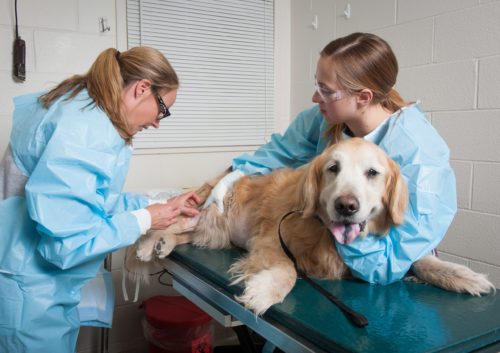
BioNexus KC and the Hall Family Foundation awarded in December the 2019 Nexus of Human and Animal Health Research Grants. Three local researchers were selected to each receive $50,000 to further the Path to 2025 regional vision: “Kansas City is a global leader at the nexus of human and animal health benefitting all our citizens and the economy.”
“Hall Family Foundation funding is supporting innovative programs in the greater Kansas City region,” said Dr. Keith Gary, Vice President of BioNexus KC. “Their investment leverages our region’s significant strength at the nexus of diseases affecting both people and animals by advancing new technologies and treatments”
Below are this year’s grant recipients and a brief description of their research projects.
Using One Health Data for Drug Discovery and Repurposing
Gerald J. Wyckoff, PhD, with the joint University of Missouri-Kansas City and Kansas State University 1Data project, will work on a project that will create a set of highly curated potential therapeutic target genes for rare disease, which can be moved quickly to in vitro and in vivo testing in animals.
Building on this, the project will construct an algorithmic approach to screening for new therapeutics in over 3,400 rare disease genes, creating a new resource and tool for precision medicine in the rare disease space. By taking a One Health approach, and using computational techniques, 1Data plans to address the major problem of the lack of availability of treatments for rare disease and do so in a way that benefits both animal and human health.
Improving Subchondral Bone Cyst Treatment Using Stainless Steel Screws in Combination with Hydroxyapatite Cement
In humans, specifically young athletes and military recruits, the loads on bones and joints can be extreme. These loads can sometimes cause damage to the bone tissue, creating what is called a “bone bruise.” If tissue damage is sufficient, it can lead to further breakdown of the bone structure and a void in the bone (under the cartilage), called a subchondral bone cyst. In animals, specifically horses bred for racing, subchondral bone cysts commonly occur. Kenneth Fischer, from the University of Kansas, Elizabeth Santschi, from Kansas State University, and their team have previously studied the mechanics of a novel lag screw treatment that clinically promotes bony healing of these cysts in horses.
Hydroxyapatite (HA) has been known for decades to induce bone formation and has been used as a coating for fixation of total joint replacements. Dr. Fischer’s team predicts that injection of HA cement into the subchondral bone cysts just prior to placement of the stainless steel lag screw will increase the success rate for full bone healing and shorten the time course of healing. They will test this prediction in horses with subchondral bone cysts.
Mechanisms of Early Cyst Formation in a Novel Porcine Model of Autosomal Dominant Polycystic Kidney Disease
Autosomal dominant polycystic kidney disease (ADPKD) is characterized by the formation
of numerous fluid-filled cysts in the kidneys which lead to a decline in kidney function. The cost of dialysis and renal transplantation for ADPKD patients is a tremendous financial burden on our health care system. There is no cure for ADPKD and treatment options are limited.
Darren Wallace, PhD, from the University of Kansas Medical Center will use these funds to address a need for large animal models of ADPKD that more accurately resemble the human condition. His group developed a novel PKD pig model that develops cystic disease in a dominant fashion, similar to human ADPKD. In preliminary data, they found that renal cysts form in utero and progressively enlarge after birth. This model will be useful to investigate the natural progression of the disease for research and drug development.
Information about the Nexus Grants, including eligibility, review criteria and application procedures, can be found on the BioNexus KC website.
###
About Hall Family Foundation:
The Hall Family Foundation is a private philanthropic organization dedicated to enhancing the quality of human life. Programs that enrich the community, help people and promote excellence are considered to be of prime importance. The Foundation views its primary function as that of a catalyst. It seeks to be responsive to programs that are innovative, yet strive to create permanent solutions to community needs in the Greater Kansas City area.
About BioNexus KC:
Through its Research Development Grants program, BioNexus KC manages a variety of individual grants for area corporations and trusts, helping them identify proposals with the best scientific, medical and technical merit. Research grants are awarded to generate initial results and stimulate the submission of major multidisciplinary research proposals to government or private agencies. BioNexus KC’s Research Development Grants program includes proposal review, evaluation by subject matter experts, written reviews for all applicants, and post-award management. The research grant program has historically provided over a 11:1 return on investment, so for every dollar invested in a grant, over $11 is returned from federal funding sources to the investigator, the institution and the community.
Media Inquiries:
BioNexus KC – Vice President
Dr. Keith Gary
kgary@bionexuskc.org
816-753-7700
BioNexus KC – Marketing and Events Manager
Shaylee Yount
syount@bionexuskc.org
816-753-7700